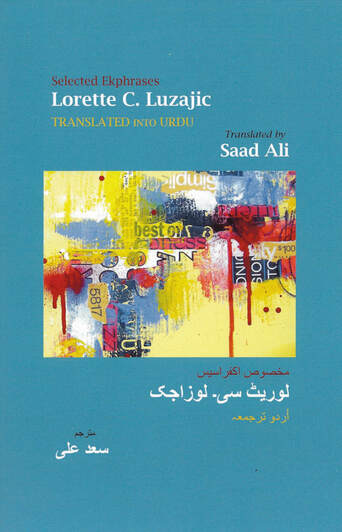Farooq Malik/A Review of Lorette C. Luzajic: Selected Ekphrases - Translated into Urdu, by Saad Ali1/4/2024 (Click on image above to view or purchase book on Amazon. Click here to download a free PDF copy- scroll down to see free ebooks, including this one.)
A Review of Lorette C. Luzajic: Selected Ekphrases - Translated into Urdu, by Saad Ali The book came my way via my very dear scholarly student and poetry connoisseur, Saad Ali. A pleasant encounter with Urdu translation by him of incisive and connotative flow from the Selected Ekphrases by Lorette C. Luzajic. Reading through this 2023 collection of ekphrases, I found myself being shown a broad landscape of life—that didn't quite catch the eye by its exotica, but rather by its subtle shades adding to the depth and richness of the panorama. The ekphrases that I was particularly moved by include: 1) The ekphrastic free verse, “Aspartame,” after Vilhelm Hammershoi’s Ida Reading a Letter, introduced me to the exquisiteness and the bond in the items arrayed for the welcome. How a letter brought home a change, reducing a fullness into vacuousness of the bustle, furore, enthusiasm, and excitement. The companionship abruptly giving way to loneliness and the abiding uncertainty of life. 2) The ekphrastic prose poem, “The Writer,” after the Empire of Light Series by Rene Magritte, is a touching rite of passage from here to eternity. The loved items of the departing loved ones is a valuable heritage, not trash. 3) The ekphrastic prose poem, “Flamingos,” after Storm Drain by William Wray: the rush of water, the deluge, the flood flow carrying along the land and the settlements underwrites the narration in this poem. The events, too, take on a flood flow. The crisis brings in a helping hand, a gesture of compassion, and a perilous effort to save. Such gestures outlive the floods. The footprints left by the flood continue to stand out as unforgettable monuments to the acts of love and regard. 4) The ekphrastic prose poem, “The Last time I Showed Up at Midnight,” after Luzajic’s own painting, The Last Time I Showed Up at Midnight: this poem invites one to take to life in fondness and see one’s farewell, while the sights are looked upon with a fading allurement for them. The poem signifies the feelings of intensity through the 'feeblest touch of humidity,' as it awakens sensitivities of the past. The nostalgia awakened by the faintest blink of the star, heralding the moment to depart. The sentimental portrait of a moment, indeed, enriches the readability of the narrative. A tribute to Luzajic. Luzajic has gleaned a rich yield of ekphrastic wit along with its awesome diversity and astuteness. The deep seated quasi colloquial narrative of routine encounters with subtle insinuations and innuendos launches one on one’s own tangent of thoughts and ruminations. That is the real tug in any narrative. Ali deserves commendation and gratitude for bringing a tasteful dish to Urdu readers by translating this piece of work into Urdu. The qualities of Urdu diction have been well preserved by Ali, while rendering Luzajic into Urdu. The translation would afford accessibility to many a keen Urdu reader. I thoroughly enjoyed this collection of ekphrastic free verses, prose poems, and flash fictions, and laud Ali for his motivation and persistence for this worthy translingual venture. Farooq Malik Farooq Malik, an ex-Army Major, but now is a Professor in English Literature. He has been teaching for the last twenty-seven years at the University of Central Punjab, Lahore, Pakistan. He has authored two collections of poetry: Marital Muddle (Authorhouse, 2021), and Kahoon Coos: Poetical Ruminations (AuthorHouse, 2008). His work has been published at The Ekphrastic Review. He is also engaged in translating into English the selected works of three great Urdu poets, which include: Ghalib, Iqbal, and Faiz; where, the aim of such a literary endeavour is to preserve the rhythm and lucidity intrinsic to Urdu poetry. Now 73, he goes hiking regularly to rejuvenate his spirits and revitalize his bond with nature. To know more about his work, please visit his Facebook Author page: www.facebook.com/FarooqMaliksRamblings. Saad Ali (b. 1980 C.E. in Okara, Pakistan) has been brought up and educated in the United Kingdom and Pakistan. He is a poet-philosopher and literary translator. His new collection of poems is titled Owl Of Pines: Sunyata (AuthorHouse, 2021). He has translated selected ekphrases by Lorette C. Luzajic into Urdu – compiled into a chapbook, Lorette C. Luzajic: Selected Ekphrases: Translated into Urdu (2023). He is a regular contributor to The Ekphrastic Review. His work has been nominated for the Best of the Net Anthology. His poems (after Amin Rehman) has been showcased at an Art Exhibition,Bleeding Borders, curated at the Art Gallery of Grande Prairie in Alberta, Canada. Some of his influences include: Vyasa, Homer, Ovid, Attar, Rumi, Nietzsche, Freud, Jung, and Tagore. He enjoys learning different languages, travelling by train, and exploring cities/towns on foot. To learn further about his work, please visit www.saadalipoetry.com, or www.facebook.com/owlofpines. Prof. F. Malik has also been published at The Ekphrastic Review: his poem, "Facial Fantasia," in a response to the "Mithila Paintings: Ekphrastic Writing Challenge" back in Jan '21: https://www.ekphrastic.net/the-ekphrastic-review/ekphrastic-writing-responses-mithila-paintings
0 Comments
Your comment will be posted after it is approved.
Leave a Reply. |
The Ekphrastic Review
COOKIES/PRIVACY
This site uses cookies to deliver your best navigation experience this time and next. Continuing here means you consent to cookies. Thank you. Join us on Facebook:
July 2024
|




